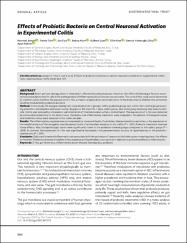Effects of Probiotic Bacteria on Central Neuronal Activation in Experimental Colitis
Citation
Sengul, N., Tore, F., Isik, S., Aslim, B., Ucar, G., Firat, T., Yabanoglu Ciftci, S., & Kukner, A. (2022). Effects of Probiotic Bacteria on Central Neuronal Activation in Experimental Colitis. Turkish Journal of Gastroenterology, 33(4), pp. 304–319. https://doi.org/10.5152/tjg.2022.201175 Abstract
Background: Brain–gut axis dysregulation is observed in inflammatory bowel disease. However, the effect of altered gut flora on neuroimmunomodulation and its role in the pathogenesis of inflammatory bowel disease are unknown. The aims of this study are to determine (i) whether colitis modifies the expression of c-fos, a marker of general neuronal activation in the brain and (ii) whether this activation could be modulated by probiotic bacteria.
Methods: In this study, 28 Sprague–Dawley rats were divided into 4 groups: colitis-probiotic group, non-colitis-fed-control group receiving probiotic Lactobacillus delbrueckii subsp. Bulgaricus B3 strain for 7 days, colitis group, and sham group receiving only sodium chloride. Colitis was induced by intracolonic administration of trinitrobenzene sulfonic acid–ethanol. The expression of c-fos was detected by immunohistochemistry in the brain tissue. Cytokines and inflammatory mediators were analyzed in the plasma. Histological scores and oxidative status were analyzed in the colon samples.
Results: The inflammatory response was accompanied by increased levels of cytokines, lipid peroxidation activities, c-fos expression in the medial nucleus of the amygdala, and decreased levels of antioxidant enzymes in the colitis (P < .001). Probiotic treatment reversed those effects. Also, histopathologic scores were significantly lower in the probiotic-treated groups compared to the colitis group (P = .035). In contrast, the expression of c-fos was significantly increased in the paraventricular nucleus of hypothalamus in the probiotic-treated rats (P < .001).
Conclusion: Colitis and intestinal inflammation are associated with the activation of neurons in the limbic system creating stress-like effects in the brain. Probiotics diversely modulate limbic response and hypothalamic axis activity in addition to protective effects in inflammation.

















